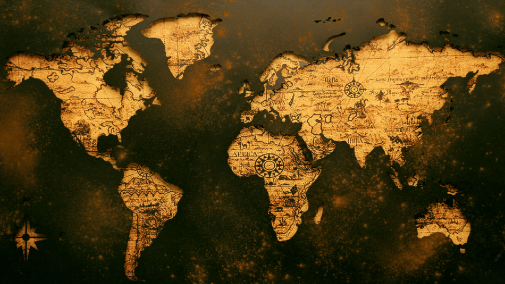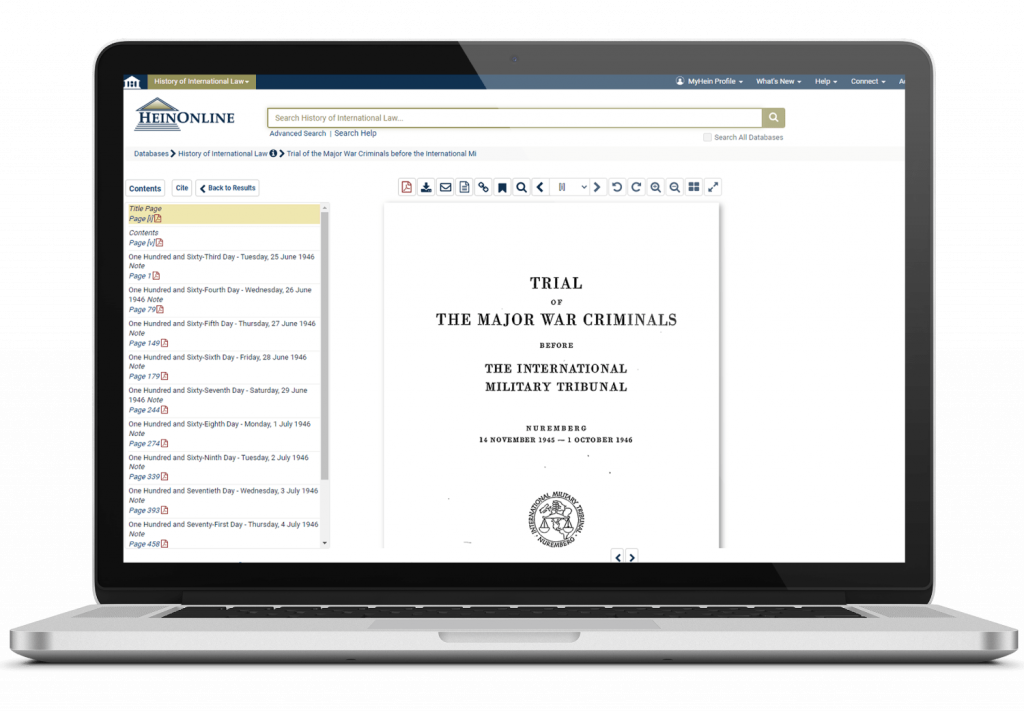
History of International Law
More than 3,100 titles relating to the history of international law, with specialization in subjects such as war and peace, law of the sea, international arbitration, The Hague conferences, and more.
3,347
TITLES
4,740
VOLUMES
1,843,411
PAGES

About the History of International Law Database
To understand international law as it exists today, it is crucial to contextualize its evolution and development. Modern international law practices have grown out of centuries of war, diplomacy, and international relations. Meanwhile, the concept of international law in general traces its foundations even further back to the historical politics, trade practices, and military endeavors of ancient civilizations.
With more than 3,100 titles and 1.7 million pages, HeinOnline’s History of International Law presents an online compilation of materials capable of launching any researcher into the study of this subject. Original sources and academic analyses relating to human rights, war and peace, the law of the sea, and other topics in international law are included in HeinOnline’s fully searchable image-based format.
Title List: KBART (TXT) | CSV | HTML
Featured Subcollections
It is debated whether war is a universal tendency of human nature, or rather the result of human beings’ ecological, sociocultural, or even economic environments. Regardless of its reason, warfare has been transforming the global landscape and changing the trajectory of its peoples for thousands of years. In a similar way, efforts toward the creation of peace have left their own impact.
With hundreds of titles on the subject, this subcollection allows users to tackle both the philosophical and practical questions of war and peace. Discover analyses of war that extend back to the 1700s, discussions of the two World Wars, ponderings about the nature of war crimes and human rights violations, and even the transcripts of major international events such as the Nuremberg Trials.
Though continents and their countries have been mapped and each nation has established its own set of laws, the majority of the Earth’s surface is covered by international water. Law of the Sea is the body of international law that guides the rights and actions of nations within these areas.
In this subcollection, discover hundreds of titles relating to the international customs, agreements, and treaties involved in the evolution of Law of the Sea.
A form of alternative dispute resolution, arbitration is a method of resolving disputes (often commercial) outside of the court system and in front of an impartial tribunal. Selected by the parties involved, the tribunal is essentially the equivalent of a judge, with powers and duties fixed by the terms of the parties’ agreement.
Increased globalization has naturally brought increased complexity to international relationships. When conflicts arise, international arbitration has become an oft-used method of resolving disputes, one with its own standards of ethical conduct independent of any particular country.
Extending back to the 1800s, this subcollection provides access to numerous titles dedicated to the discussion of international dispute resolution.
The Hague in the Netherlands has become known as the “international city of peace and justice” since it hosted the first global Conference of Peace in the late 19th century. In the years since, the city has become host to a variety of different international bodies, including the International Criminal Court, the International Court of Justice, the Hague Academy of International Law, and the fourth centre for the United Nations.
Ever since the first Peace Conference, the Hague has become the location of several other Conferences and Conventions. Find them in this HeinOnline subcollection, along with other documents from bodies headquartered at the Hague.
In addition to the topic-specific content offered by other subcollections, find hundreds of books, serials, scholarly articles, and more as well as a bibliography of other works related to the history of international law. Notable authors include:
- William Douglas
- William Edward Hall
- Philip C. Jessup
- Hans Kelsen
- Samuel Pufendorf
- James Wilford Garner
- Hugo Grotius
- Manly Ottmer Hudson
- And many more!
 It is debated whether war is a universal tendency of human nature, or rather the result of human beings’ ecological, sociocultural, or even economic environments. Regardless of its reason, warfare has been transforming the global landscape and changing the trajectory of its peoples for thousands of years. In a similar way, efforts toward the creation of peace have left their own impact.
It is debated whether war is a universal tendency of human nature, or rather the result of human beings’ ecological, sociocultural, or even economic environments. Regardless of its reason, warfare has been transforming the global landscape and changing the trajectory of its peoples for thousands of years. In a similar way, efforts toward the creation of peace have left their own impact.
With hundreds of titles on the subject, this subcollection allows users to tackle both the philosophical and practical questions of war and peace. Discover analyses of war that extend back to the 1700s, discussions of the two World Wars, ponderings about the nature of war crimes and human rights violations, and even the transcripts of major international events such as the Nuremberg Trials.

Though continents and their countries have been mapped and each nation has established its own set of laws, the majority of the Earth’s surface is covered by international water. Law of the Sea is the body of international law that guides the rights and actions of nations within these areas.
In this subcollection, discover hundreds of titles relating to the international customs, agreements, and treaties involved in the evolution of Law of the Sea.
A form of alternative dispute resolution, arbitration is a method of resolving disputes (often commercial) outside of the court system and in front of an impartial tribunal. Selected by the parties involved, the tribunal is essentially the equivalent of a judge, with powers and duties fixed by the terms of the parties’ agreement.
Increased globalization has naturally brought increased complexity to international relationships. When conflicts arise, international arbitration has become an oft-used method of resolving disputes, one with its own standards of ethical conduct independent of any particular country.
Extending back to the 1800s, this subcollection provides access to numerous titles dedicated to the discussion of international dispute resolution.
 The Hague in the Netherlands has become known as the “international city of peace and justice” since it hosted the first global Conference of Peace in the late 19th century. In the years since, the city has become host to a variety of different international bodies, including the International Criminal Court, the International Court of Justice, the Hague Academy of International Law, and the fourth centre for the United Nations.
The Hague in the Netherlands has become known as the “international city of peace and justice” since it hosted the first global Conference of Peace in the late 19th century. In the years since, the city has become host to a variety of different international bodies, including the International Criminal Court, the International Court of Justice, the Hague Academy of International Law, and the fourth centre for the United Nations.
Ever since the first Peace Conference, the Hague has become the location of several other Conferences and Conventions. Find them in this HeinOnline subcollection, along with other documents from bodies headquartered at the Hague.
In addition to the topic-specific content offered by other subcollections, find hundreds of books, serials, scholarly articles, and more as well as a bibliography of other works related to the history of international law. Notable authors include:
- William Douglas
- William Edward Hall
- Philip C. Jessup
- Hans Kelsen
- Samuel Pufendorf
- James Wilford Garner
- Hugo Grotius
- Manly Ottmer Hudson
- And many more!
